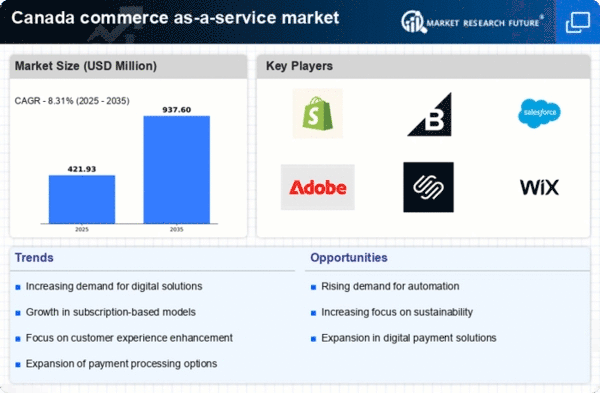Increased Focus on Data Analytics
The commerce as-a-service market in Canada is increasingly driven by the focus on data analytics. Businesses are recognizing the value of data in understanding consumer behavior and preferences. In 2025, it is projected that companies utilizing data analytics will see a 20% increase in customer retention rates. By leveraging analytics, businesses can tailor their offerings, optimize pricing strategies, and enhance marketing efforts. This data-driven approach allows for more informed decision-making, ultimately leading to improved sales performance. As competition intensifies, the ability to harness data effectively becomes a critical differentiator. Consequently, the demand for commerce as-a-service solutions that incorporate robust analytics capabilities is likely to grow, enabling businesses to stay ahead in a dynamic market.
Expansion of Omnichannel Retailing
The expansion of omnichannel retailing is a pivotal driver for the commerce as-a-service market in Canada. Consumers now expect a seamless shopping experience across various channels, including online, mobile, and in-store. In 2025, it is anticipated that over 60% of Canadian retailers will adopt an omnichannel strategy, integrating their online and offline operations. This shift necessitates the implementation of commerce as-a-service solutions that facilitate inventory synchronization, customer data integration, and consistent branding across platforms. By providing a cohesive shopping experience, businesses can enhance customer loyalty and drive sales. The ability to track customer interactions across channels also allows for personalized marketing efforts, further solidifying the importance of omnichannel strategies in the commerce as-a-service market.
Rising Demand for E-commerce Solutions
The commerce as-a-service market in Canada experiences a notable surge in demand for e-commerce solutions. As consumers increasingly prefer online shopping, businesses are compelled to adapt. In 2025, e-commerce sales in Canada are projected to reach approximately $50 billion, indicating a robust growth trajectory. This shift necessitates the adoption of commerce as-a-service platforms that facilitate seamless online transactions, inventory management, and customer engagement. Companies that leverage these services can enhance their operational efficiency and customer satisfaction. The growing trend of mobile commerce further amplifies this demand, as mobile devices account for a significant portion of online sales. Consequently, the commerce as-a-service market is positioned to thrive as businesses seek to capitalize on the evolving retail landscape.
Growing Emphasis on Customer Experience
The growing emphasis on customer experience is a significant driver of the commerce as-a-service market in Canada. As competition intensifies, businesses are increasingly prioritizing customer satisfaction to differentiate themselves. In 2025, studies indicate that companies focusing on customer experience will outperform their competitors by 25% in terms of revenue growth. This trend compels businesses to adopt commerce as-a-service solutions that enhance user interfaces, streamline checkout processes, and provide personalized recommendations. By investing in customer experience, companies can foster brand loyalty and encourage repeat purchases. Furthermore, the integration of customer feedback mechanisms within these platforms allows businesses to continuously improve their offerings. Thus, the commerce as-a-service market is likely to flourish as organizations recognize the critical role of customer experience in driving success.
Technological Advancements in Payment Solutions
Technological innovations in payment solutions significantly influence the commerce as-a-service market in Canada. The rise of digital wallets, contactless payments, and blockchain technology has transformed how transactions are conducted. In 2025, it is estimated that over 40% of Canadians will utilize digital payment methods, reflecting a shift towards convenience and security. This evolution compels businesses to integrate advanced payment solutions into their commerce as-a-service offerings. By doing so, they can provide customers with a variety of payment options, enhancing the overall shopping experience. Moreover, the integration of fraud detection and cybersecurity measures within these platforms is crucial, as it fosters consumer trust and encourages higher transaction volumes. Thus, the commerce as-a-service market is likely to expand as businesses adopt these innovative payment technologies.





















Leave a Comment